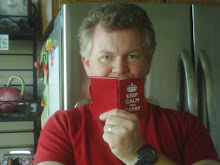Rambling at Midnight
He seemed pretty adamant about it, as he insisted that religion was the root of all the evil in the world.I almost had to laugh. I wondered what it was about kids that age, not that I can call myself an elder in society, that there is no room for moderation. From what I remember of him, he was a student in college, and not necessarily a very bright one at that. Said at some point that he worked handing out towels at the campus gym, not that there's anything wrong with that. A job is a job, but at the same time, there were times when he'd refer to the money he spent on cigarettes and other non-educational expenses he was accruing, and I seriously wondered just how deeply he thought about things.
I remember he posted on the boards some completely unsupported assertion about whether tribalism was indeed a phase of civilization. He cited an unnamed instructor, probably in an intro course. Fond memories, there. I remember leaving high school, and being exposed to an entirely new universe in the first few freshman-level classes I attended. Everything I'd ever learned before that was turned upside down, and now I was truly enlightened, and I very nearly said, "I've learned all I need to know, hang those upper-division classes."
It was about the same with nearly everyone I knew in college... "this guy KNOWS his stuff..." we mused. As we pressed on, however, new classes required more exposure to different sources, other points of view. Now the answers weren't so clear, and that intro class barely scratched the surface; in fact, in a lot of cases, they turned out to be more or less pulpits for certain instructors to preach their thesis to a new, unsuspected wave of students.
I remember one of my junior years, the year of the "affair," I was confronted, not in a hostile manner, but another of my friends sort of laughed at me. Not in a patronizing, malicious, or condescending way, but they kind of laughed at their little brother who was unaware of what he was about to encounter in life.
Mostly, that absolutes in life are rare, and almost always invalid. Don't get me wrong, I do believe there is an absolute standard to which we should all strive to attain, I just do not completely believe we are all necessarily... well, for one, on the same road to the same destination, and for two, I'm not necessarily sure we need to be on a road to anywhere to get to where we're going.
I don't know that being a Lutheran has always been important to me. I've felt that of all the Christian denominations, we're probably the closest to the "correct" path, but as the Church trudges on and on, it seems more pre-occupied with the notion that we do not in fact hold the monopoly on the truth. What's the point, then?
Well, "organized religion" has its place. It does have a purpose. To me, it provides an infrastructure of support for like-minded believers on their journey. The Church, however, is not the end-all in seeking the Kingdom of God. Indeed, it is necessary for the believers to hold together, to build each other up, but the work at hand, being the presence of Christ in the world does not require every one hole up in the sanctuary and associate only with card-carrying members of the denomination.
It's just the opposite, really. The work of Christ requires us to leave the fold, if only for a time to return again, and to actually mix with the people outside the circle. In the same way the Gospel has been translated into many languages, often employing different idioms to get the point across, witnesses to the Gospel might have to adapt themselves somewhat, and witness more in deed than in word.
Jesus himself sharply criticized the hypocrites of the day for observing the laws of piety in the society, but never doing what God would have us do, and what God has done for us, repeatedly. Lower ourselves to feed the poor, and heal the sick, even if it sometimes means breaking the ceremonial law once in a while. Jesus was a veritable fount of situational ethics, often asking, "Which is more important..." The prophet Amos similarly attacked the hypocrites of his day, observing that while the temple was well-kept and there were routine sacrifices, there were people being dealt with unjustly in iniquity.
Often, like my laughing friend in college taught me, the answers are not always that clear. Sometimes holding fast to the rules of one's sect will do more harm than good. Sometimes, maybe, it's better to give the lamb to the beggar, rather than offer it to be a burnt offering. Sometimes, it is better to be one with the "sinners" and the "unbelievers" to affect justice and mercy in an otherwise hopeless society than it is to "stay with one's own."
I wish all the best to my younger friend. I look forward to a day when we can sit down to supper and break bread, and plan a new world together.
Labels: late night thoughts

